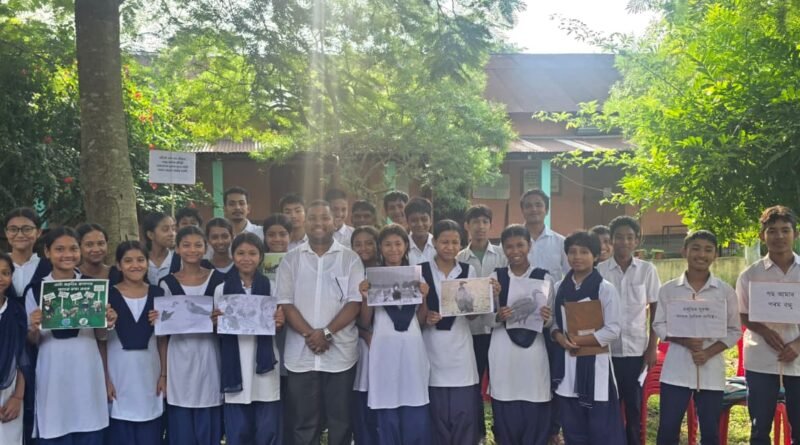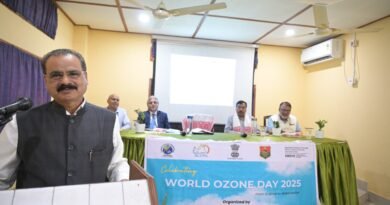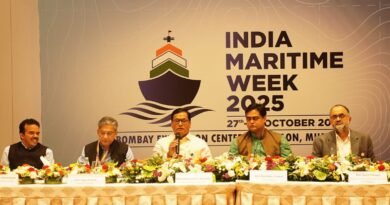Vulture Awareness Program and Quiz Competition Triumphs at Dhakuakhana Higher Secondary School
Dhakuakhana, September 6, 2025: In a spirited celebration of environmental consciousness, the Eco Club of Dhakuakhana Higher Secondary School, in collaboration with WeNaturalists, successfully hosted a Vulture Awareness Program and Quiz Competition on Saturday, September 6, 2025. Held at the school premises, this event was a vibrant blend of education, engagement, and advocacy, aimed at highlighting the critical role of vultures in maintaining ecological balance. Exclusively organized for Eco Club members, the program drew enthusiastic participation from students, faculty, and environmental advocates, marking a significant milestone in fostering conservation awareness among the youth.
The event was inaugurated by Kalpana Gogoi, the esteemed patron of the Eco Club and Principal of Dhakuakhana Higher Secondary School. In her opening address, Gogoi passionately underscored the importance of protecting biodiversity, with a special focus on vultures, often referred to as nature’s cleanup crew. She emphasized that vultures play an indispensable role in preventing the spread of diseases by consuming carrion, thus maintaining a healthy ecosystem. Her words inspired the audience to embrace their responsibility as stewards of the environment and to actively contribute to conservation efforts.
The Vulture Awareness Program was expertly led by Manash Pratim Dutta, a multifaceted educator, poet, writer, author, and WeNaturalists Campus Champion, alongside environmental activist Dhruba Jyoti Chetia. Their presentations were both informative and thought-provoking, delving into the ecological and cultural significance of vultures. They highlighted the drastic decline in vulture populations due to threats like habitat destruction, poisoning, and the use of harmful veterinary drugs such as diclofenac. Dutta and Chetia urged the attendees to advocate for vulture conservation and adopt sustainable practices to protect these vital species. Their engaging delivery captivated the audience, sparking meaningful discussions on the urgent need for environmental action.
Manash Pratim Dutta, in his address, emphasized the cultural and ecological significance of vultures, stating, “Vultures have been known since the pages of the epic Ramayana. In Valmiki’s Ramayana, it is mentioned that after Ravana abducted Sita, the monkey army, in their search for her, grew disheartened. It was Sampati, an old vulture and brother of Jatayu—who lost his life trying to stop Ravana—that provided crucial information about Sita’s whereabouts. In Madhya Pradesh, the Griddhraj Parbat, meaning ‘Vulture King Mountain,’ holds religious, archaeological, and ecological significance, believed to be the birthplace of Sampati. Similarly, in Bihar, Griddhakuta, or ‘Vulture’s Peak,’ is a culturally significant site. In Hindu mythology, vultures are revered as divine mothers, though not considered beautiful.” He further highlighted the alarming decline of vultures, noting, “In the 1960s, countless vultures—king vultures, white-rumped vultures, Himalayan griffons—roamed our villages. While most vultures live in flocks, king vultures are often solitary or seen with other species. Today, seeing even four or five vultures together is rare, and news of their deaths due to poisoning or other causes is all too common.”
Dhruba Jyoti Chetia added a sobering perspective on the causes of vulture decline, stating, “From our direct experiences, we can identify several reasons for the scarcity of vultures: lack of habitat, superstitions among people, food scarcity, and excessive electromagnetic radiation. In recent times, Himalayan griffons, a winter migratory vulture, have faced the highest mortality due to poisoning, followed by white-rumped vultures. A unique issue in Assam is the reckless poisoning of stray dogs. People, frustrated by stray dogs attacking livestock, poison carcasses with deadly chemicals like Furadan or Carbofuran to kill the dogs. While dogs, with their keen sense of smell, avoid these poisoned carcasses, vultures, lacking such olfactory ability, consume them and die. This has been a recurring tragedy across Assam.” Chetia called for urgent action, saying, “Vultures are nearly extinct. Those responsible for their deaths must face legal scrutiny, and alongside awareness programs, strict measures are needed to prevent such incidents. Otherwise, these tragedies will continue, and people will dismiss them, thinking, ‘It’s just a vulture, what’s the loss?’ Vultures have had a spiritual and ecological bond with humans since ancient times, yet human shortsightedness, habitat loss, and food scarcity are driving these friends of humanity to extinction. Let us take the initiative to conserve nature’s cleanup crew and inspire others to do the same.”
The centerpiece of the event was a dynamic quiz competition centered on the theme of “Vultures and Birds.” Designed exclusively for Eco Club members, the quiz aimed to test participants’ knowledge while fostering a deeper understanding of avian species and their ecological roles. Each team comprised three members, and the competition was skillfully moderated by Manash Pratim Dutta, who also serves as the Eco Club Teacher In-Charge and WeNaturalists Campus Champion. The questions spanned topics such as vulture behavior, habitats, conservation challenges, and broader environmental issues, making the quiz both educational and engaging.
The quiz was seamlessly organized, with Bijoy Prasad Kanu, Dipam Jyoti Boruah and Jiarul Ali overseeing the scoring and coordination. Their meticulous efforts ensured a fair and smooth competition, allowing participants to focus on showcasing their knowledge and enthusiasm. The teams competed with remarkable zeal, demonstrating not only their understanding of the subject matter but also their commitment to environmental causes. The lively atmosphere was a testament to the students’ passion for learning and their dedication to conservation.
The collaborative spirit of the Eco Club, Dhakuakhana Higher Secondary School, and WeNaturalists was evident throughout the event, creating a powerful platform for education and inspiration.
In a statement, Kalpana Gogoi, advisor to the Eco Club, expressed her gratitude to all participants and organizers, stating, “This program is a testament to the power of collective action in raising awareness about critical environmental issues. Vultures are unsung heroes of our ecosystem, and events like these empower our youth to champion their conservation.” Abhigyan Mili, president of the Eco Club, echoed her sentiments, emphasizing the role of such initiatives in nurturing environmentally conscious leaders. Manash Pratim Dutta, the event’s coordinator, and Bijoy Prasad Kanu, co-coordinator, were widely praised for their exceptional planning and execution, which ensured the program’s resounding success.
The Vulture Awareness Program and Quiz Competition achieved its goal of blending education with engagement, leaving a lasting impact on all participants. By focusing on the often-overlooked role of vultures, the event highlighted the interconnectedness of all species in maintaining a balanced ecosystem. It also underscored the importance of youth involvement in environmental advocacy, encouraging students to take proactive steps toward conservation.
This initiative sets a shining example for other educational institutions, demonstrating how collaborative efforts can amplify the message of environmental stewardship. The Eco Club and WeNaturalists expressed their commitment to organizing more such programs to further the cause of conservation and inspire future generations. The success of this event is a promising step toward a more sustainable future, where young minds are empowered to protect and preserve the natural world.




